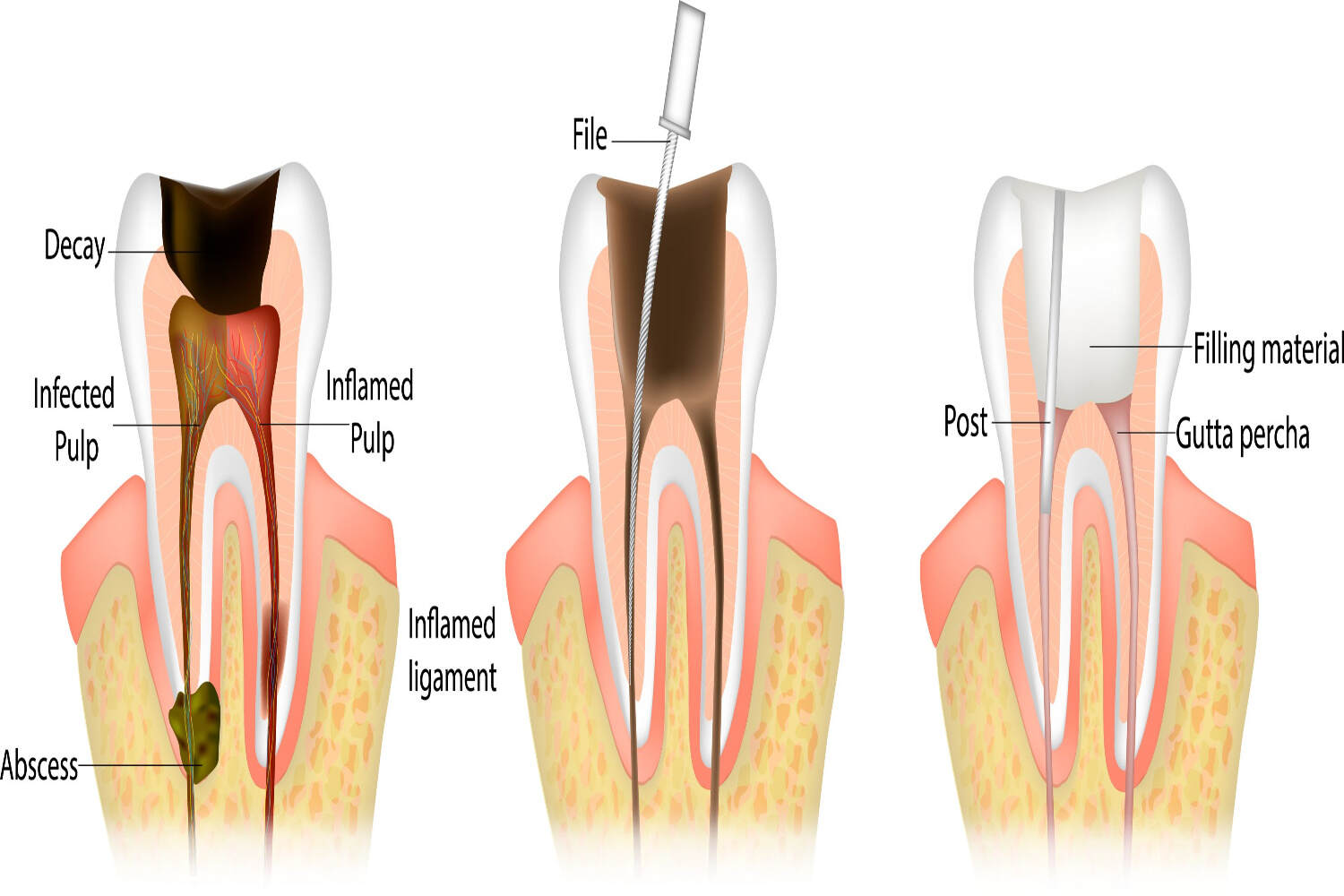
Does your kid suffer from tooth decay and intense tooth pain? Have you been told your kid may have to undergo a root canal procedure? Are you worried if a root canal for kids is a safe procedure? Well, fret not! We are here to solve all your queries through this informative blog. Tooth decay or dental caries is a progressive breakdown, destruction, or damage to the enamel (hard outer covering of the tooth). Tooth decay is common among kids due to poor oral hygiene and unhealthy eating habits. Deep caries with pulpal involvement cannot be restored with regular fillings, and thus require a more comprehensive approach through root canal treatment.
Root canal for kids is a common procedure that can be performed in primary and permanent teeth. This can be as prevalent as 9.6% in kids, and among the RC-treated teeth, permanent teeth were 69.8% [1]. Read on to know if a root canal for kids is safe, and what precautions you need to consider as a parent for your kid’s well-being post-procedure.
In This Article
- What is a Root Canal?
- Is Root Canal Safe For Kids?
- Signs That Your Child Requires a Root Canal
- What Precautions to Take While Undergoing Root Canal?
- Tips to Help You Deal With Root Canal in Kids
- What to Expect When Your Child is Recovering From a Root Canal?
- When Should You Consider Seeing a Pediatric Dentist?
- FAQ’s
What is a Root Canal?

Root canal is a surgical procedure that involves the removal of the infected pulp tissues, and replacing it with a biocompatible material. This helps restore the oral form, function, and appearance by preserving the natural tooth structure. Root canals when performed in kids are the same as adult ones, however, the approach may vary. The RC-treated teeth in kids, especially the primary ones, are usually filled with a resorbable material that does not hinder the normal exfoliation of the primary roots.
Root canals for kids are of two types, namely-
1. Pulpotomy: During this procedure, the pulp of the tooth in the crown part (coronal pulp) is removed and the pulp in the root (radicular pulp) is left intact.
2. Pulpectomy: During this procedure, the entire infected pulp (coronal and radicular) is removed.
Is Root Canal Safe For Kids?

As a parent, getting a root canal for your kid can be daunting. This may spark anxiety since you do not want your kid to endure pain. The term ‘root canal’ can instill a feeling of fear in you and your kids. However, as technology has evolved tremendously, root canals are now performed in a much more convenient manner, especially for kids. Several research studies were conducted based on clinical and radiographic evaluations to determine the success rates of root canals for kids. Most of the evaluated teeth had successful treatments, around 79.9% [2].
With the evolution of advanced technology, pediatric dentists have replaced regular hand files with rotary files for complex root anatomies in primary teeth. This also helps to reduce the mouth opening required in kids and procedure time [3]. Furthermore, dentists opt for multiple-visit root canals for kids since they are much safer, and more effective, with minimal complications than single-visit procedures [4].
Signs That Your Child Requires a Root Canal

Not all tooth decay in kids may require a root canal procedure. However, studies show that the prevalence of immature permanent posterior teeth with pulpal involvement was 36.9% which requires a root canal [5]. There are a few classic signs of pulpal involvement requiring a root canal like-
- Intense and excruciating tooth pain
- Difficulty in chewing or swallowing
- Discoloration of the affected tooth
- Increased tooth sensitivity to hot, cold, and sweet foods
- Red, swollen gums that can bleed easily
- Fever (more than 102 ℉)
- Facial swelling and asymmetry
- Halitosis (bad breath)
What Precautions to Take While Undergoing Root Canal?

Before undergoing a root canal procedure there are certain precautions to be taken to help ease the child’s anxiety and prevent any post-procedure complications.
- Take the child with a full stomach to the dentist. This is because the root canal is performed under local anesthesia to numb the area, and the effect may take 2 to 3 hours to fade away. It can be uncomfortable for a child to take in any food. Also, hydrate the child well
- Your dentist may prescribe an antibiotic course for severe infection before the procedure, since the anesthesia may fail to work, and make the root canal challenging
- Always carry the child’s favorite toy or blanket to help calm them during the procedure
- Prepare the child mentally and emotionally. Ensure the pediatric dentist talks to the child and explains the procedure in the most simple way possible to remove any fear or anxiety
- Inform the pediatric dentist about any past negative dental experience to discuss what went wrong and how it can be overcome with different approaches
Tips to Help You Deal With Root Canal in Kids

If your child needs a root canal it can be daunting for you and them. It is important to take time and prepare yourself as a parent with the following tips that can help you deal with the procedure-
- Prepare and educate yourself about the procedure. Know what exactly happens during a root canal, and what to expect during the recovery process. Once you are familiar with the process, you can explain it to your child easily
- Remember to be calm and model positive behavior to inspire your child. Your behavior can set a positive example for your child and help ease their anxiety. An anxious parent can instill fear in their child
- Describe the procedure to your child in simple and easily understood terms. Knowing what happens can ease the fear and anxiety in your child
- Make them familiar with the dental clinic atmosphere and the need for anesthesia. Let them know that it is normal to hear grinding noises or to feel vibrations while the dentist works on their teeth
- Explain to your child the benefits of the procedure and how they can be pain-free and won’t have to suffer
What to Expect When Your Child is Recovering From a Root Canal?

There is a recovery phase after a root canal like any other dental procedure or treatment. You can expect the following when your child is recovering from a root canal-
- The child may experience some pain and discomfort after a root canal. Do not worry since this is normal and temporary. The pediatric dentist will prescribe painkillers for pain management
- There may also be mild swelling in the child’s jaw which is also a part of the recovery process
- The child may be hesitant to eat or drink due to the effect of anesthesia, thus give them some time to recover until the numbness wears off
- You are expected to follow a good oral hygiene routine for the child through regular brushing and flossing
When Should You Consider Seeing a Pediatric Dentist?

It may take 5 to 7 days for the kid to recover from a root canal. Mild pain and swelling are normal and temporary. This may resolve gradually over time. However, you should consider seeing the pediatric dentist right away for the following that may indicate a tooth infection-
- Intense tooth pain
- Sore and bleeding gums
- The treated tooth and surrounding gums feel hot
- Pus discharge from the gums surrounding the treated tooth, due to the formation of an abscess
- Sudden high-grade fever (> 102 ℉)
- Extreme tiredness
- Persistent jaw swelling with facial asymmetry
Root canals are considered safe for kids when they are mentally and emotionally prepared for it, and when performed by an experienced and skilled pediatric dentist. Failure to restore the tooth can lead to adverse consequences like extreme pain, infection, and an increased risk of losing the tooth. Thus root canals can help rehabilitate and rejuvenate the child’s oral, and overall health. Root canal in kids is safe these days. So, in case your kid has to undergo root canal, don’t panic, and put your child at ease too.
FAQ’s
1. At What Age Should You Get a Root Canal?
There is no specific age to get a root canal. Anybody can get this procedure irrespective of age if the dentist deems it necessary in cases of severe tooth infection.
References
- Endodontic treatments on permanent teeth in pediatric patients aged 6–12 years old – [https://www.ncbi.nlm.nih.gov/pmc/articles/PMC10316424/]
- Outcomes of root canal treatment of first permanent molars among children in Jeddah, Saudi Arabia: A retrospective cohort study – [https://www.ncbi.nlm.nih.gov/pmc/articles/PMC9589176/]
- Rotary endodontics in primary teeth – A review – [https://www.ncbi.nlm.nih.gov/pmc/articles/PMC4688451/]
- Single-visit or multiple-visit root canal treatment: systematic review, meta-analysis and trial sequential analysis – [https://www.ncbi.nlm.nih.gov/pmc/articles/PMC5293988/]
- Endodontic and Restorative Treatment Patterns of Pulpally Involved Immature Permanent Posterior Teeth – [https://www.ncbi.nlm.nih.gov/pmc/articles/PMC6035824/]

